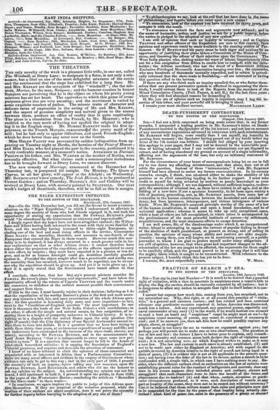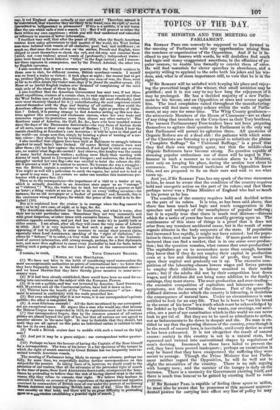PRACTICE OF SEAR-CH AT SEA.
TO TUE EDITOR OF THE SPECTATOR.
'London, 24th January 1842- Stu—You say in your last Number—" It is much to be desired that a guarded right of visitation, with a view to ascertain in suspicions cases a vessel's title to display the flag she carries, should be mutually conceded by all nations : but it is dangerous to allow any nation to arrogate that right to itself before it is con- ceded.'
I cannot but express how much this, coming from you, has surprised, not to say astonished me. 'Why, this' right, or at all events this practice of " visita- tion " is a general and common custom ; and has existed and been exercised whenever any particular occasion required it, before America was discovered, much less a nation. Ask any experienced, any practical person, especially any naval commander of any navy (1) in the world, if he would hesitate one moment _to send a boat on board any "suspicious" vessel Ile might meet at sea ?—by suspicious vessel meaning, of course, any vessel he considered it necessary to visit; and if he answers yes, then ask him how he could possibly capture any pirate, slaver, or smuggler? Your metal is too heavy for me to venture an argument against you; but perhaps you will permit me to make one or two observations. The question is one of law and fact : the former I leave to better pens to explain, only remark- ing that necessity and common sense both declare the right of visitation must exist; it is not something new, on which England wishes to make as it were a new law. The law and custom in such cases is already established, (2) and not to be made ROW either by England or America; and with regard to the quibble invented by America relative to the right of search not being legal in a state of peace, (3) it is evident this is not at all applicable to the present ques- tion; not having even the letter of the law in its favour, unless a search is to be confounded with a simple visit, in which ease I havenothing more to say. Be- sides, when the different authors cited as authorities on the law of nations were establishing general rules for tbe conduct of belligerents and neutrals does any man in his senses suppose they included pirates and outlaws, :Savers and smugglers? that such characters were to have the benefit of the forms and observances due to traders ? (4) and that when, certain occasions or parti- cular circumstances produced, as it were, such description of vessels at any part or locality of the ocean, they were not to be rooted out without ceremony ? Can it be believed that those writers meant their rules and principles were not to be suspended for the time by the peace of that locality being actually dis- turbed ? what kind of peace can exist in the presence of a pirate or slaver ? nay, is not England always actually at war with such? Therefore, cannot! it be maintained, that wherever they are likely to be found, even the right of search (permitted to belligerents) is permanent? If this is a quibble, it is normalise than the one which calls a visit a search. (5) But I will proceed to relate the facts within my own experience ; which you will find confirmed and extended on reference to sources of better information.
I recollect very well, that after the peace of 1815, when the South American
contest drew many adventurers to that quarter of the world, the West Indian seas were infested with vessels of all character, good, bad,' and indifferent ; so much BO, that soon the men-of-war on the station, French and English, were obliged to exert themselves to cheek the evil, and did stop and examine these
(mind, not mere traders) armed vessels of (professedly) independent states : some were found to have defective "titles" to the flags carried; and I remem- ber three captures in consequence, one by the French Admiral, the other two by English corvettes.
I also recollect that it was a common practice with the French' cruisers in those seas to visit, for different reasons, British merchant-vessels. I myself was on hoard a trader so visited: it took place at night ; the master had to get up, produce lights, his papers, &c. Especially one man-of-war, the Rose, went so far as to often detain the trader some days if he found the smallest excuse. (6) None of us lawful English traders ever dreamed of complaining of the mere visit, only of the abuse of them by the Rose. I also recollect that the American Government has Bent two, if not three small expeditions, cruisers of a certain class, to visit suspicious vessels and clear the West Indian seas of such characters ; which they did most effectually, (and were most sincerely thanked for it ;) notwithstanding the said suspicious vessels covered themselves with the flags and bunting of all nations. How could the American officers perform their duty without the right or practice of visita- tion ? Indeed, it is passing Strange to find America setting up this new doc- trine against this necessary and wholesome custom, when her own trade and commerce require its protection more than almost any other nation's! The Southern coast of America, the Gulf, &c. &c., have ever been troubled waters since the days of the Buccaneers downwards—the very focus of lawless deeds of all sorts, more so than even the coast of Barbary I (7) I think I hear the rascals chuckling at Jonathan's cute invention : it will be news in that part of the world—an escape scot-free, simply by hoisting a-piece of bunting of a cer- tain colour : they already live by hoisting false flags ! I also recollect that clippers have been built at Baltimore to smuggle tabacco (packed in small bales) into Ireland. Of course British cruisers were sent after them ; (8) but how capture the criminal, if not leyal to visit any or every one, no matter what flags she carried ? And observe, this locality was the course of many lawful American traders ; nothing more likely than meeting with dozens of such bound to Liverpool and Glasgow; and moreover, the American smuggler carried her own flag—she was entitled to hoist the colours she did: did it prevent a visit ? It is -useless to answer, No because she was a smuggler : was the British captain a conjuror to know so beforthand=befort the visit ! You might as well tell a policeman to catch the rogues, but mind not to look at or speak to any man. I am certain no-sailor can mention this monstrous pre- tension with a grave face. (9) Then as to the consequences—the importance of a visit to a trader at sea, which is actually described in an American state paper as au " outrage " or" violence "! Why, the trader has to back her maiuyard a quarter or half an hour ; a thing vessels at sea are glad to do on every trifling occasion—for instance, for an old newspaper or a bucket of potatoes ! and, forsooth, this is the enormous wrong and injury, for which the ' peace of the world is to be dis- turbed! (10) Nor is it explained how the cruiser is to manage when the flag cannotbe seen ; as in my own case, at night, or in fogs, &e. &c. The Americans manufacture laws for themselves, and what is worse, alter their law to suit particular cases. Sometimes they act very summarily and with great despotism, at other times with excessive licence. North and South embrace opposite extremes' and yet find law (or make it) to justify both or either course. I am afraid, after all, they will cause the very name of Liberty to stink. And it is very injurious to find such a paper as the Spectator appearing, if not to justify, in some measure to excuse their present claim, especially when Lord ABERDEEN, speaking of the "right of visitation," de- clares he " believes" it to exist,—a very weak term for one at the fountain- head of correct information, still strong enough, perhaps, for a first diplomatic note, and more than sufficient to cause every journalist to look for facts, before writing such a paragraph as the one I have quoted at the commencement of this.
(1) We have not been in the habit of considering naval commanders the most unexceptionable authorities on points of international law: we know that they have frequently been in the habit of acting as our correspondent states— and we know likewise that they-have thereby given occasion to some'unne- cessary wars.
(2) If it had been already established, there would have been no need for en- tering into conventions on the subject with the European Powers.
(3) It is not a quibblei,and Was not invented by America: Lord STOWELL, with MARTENS and all the Continental jurists, have laid it down as law.
(4) Thieves have the benefit of the "forms and observances" of law : they must be arrested in cdzifoirrnity With the mode prescribed law.
(5) But even admitting that it is not worse, it is our correspondent's private quibble; the other is retiognizid law. (6) A most felicitous example! All the facts-mentioned by our correspond- ent are exceptional cases. He gigues like a man who would say, that because the Habeas Corpus was suspended in 1819, its regulations need not be observed. (7) Our correspondent forgets, that by the common consent of all nations pirates are placed beyond the pale of law, but that all nations are not agreed to consider slavers in the same light. It may be desirable that they should, but until they are all agreed 'on this point no individual nation is entitled to take the law in its own hands.
(8) Would a British cruiser dare to meddle with such a vessel on the high Seas?
(9) And yet it may be a grave subject : our correspondent ivrites quarter- deck.
(10) Perhaps we have the honour of having the Captain of the Rost himself for a correspondent. The tone of his letter is a fair specimen'athe temper in which the right of search asserted by Great Britain has too frequently been ex- ercised towards American vessels.
The meeting of Parliament being likely to occupy our columns perhaps too
fully, for some time, we respectfully decline further correspondence on this subject for the present. In taking leave of it, however, we would recall to the attention of our readers,Ahat all the advocates of the pretended'right of search in the time of peace, from Lord ABERDEEN downwards, misrepresent the Ame- ricans by pretending to believe that the risk of having slavers stopt is the only reason why they refuse to concede that right. We believe they hesitate to concede it mainly on account of their experience of the oppression and injustice exercised by commanders of British men-of-war under the pretext of reclaiming British deserters and impressing British-born men of war. Give the Arneri- Cans security on that head, and there will be no great difficulty in persuading them to a convention establishing a guarded right of search.]



























 Previous page
Previous page